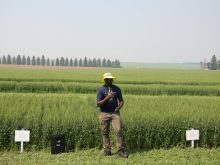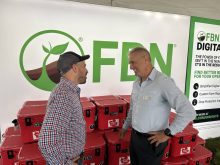Saskatchewan has been chosen as the site for a farmer-owned urea fertilizer plant — again.
Genesis Fertilizers LP has announced its intention to build a $1.7 billion plant in Belle Plaine.
A similar announcement was made a decade ago at the 2013 DTN Ag Summit in Chicago.
At that time the project was being spearheaded by Farmers of North America.
ProjectN was going to be a $1.76 billion plant capable of producing 1.2 million tonnes of urea and 425,000 tonnes of UAN liquid fertilizer.
No site had been selected at the time of the Chicago meeting, but soon after the company chose Belle Plaine as the location. The plant was scheduled to be operational by 2017.
Read Also

Research looks to control flea beetles with RNAi
A Vancouver agri-tech company wants to give canola growers another weapon in the never-ending battle against flea beetles.
That did not happen.
The original idea was to partner with a “big conglomerate” with deep pockets.
“It never quite worked out,” said Barrie Mann, vice-president of investor relations for Genesis.
The project also got sidetracked by FNA’s failed attempt to buy the Canadian Wheat Board, he told potential investors attending a meeting at the Western Canadian Crop Production Show in Saskatoon.
The project got new life in 2020 when the Alberta government announced its Alberta Petrochemicals Incentive Program.
That was the spark needed to form a new company in 2021 to shepherd a revamped project.
Farmers who invested in the original FNA project were compensated with shares in Genesis.
The new board includes former Fertilizer Canada president Garth Whyte and former Yara Canada vice-president of asset development Kathy Jordison.
The new plan is to build a smaller plant that will be owned by farmers and not reliant on outside partners.
StoneX fertilizer analyst Josh Linville thinks it is a good idea.
“It is something that is absolutely needed,” he said.
Major fertilizer companies are also expanding production but the gap between supply and demand will continue to grow.
“I’m a big advocate that we need more production and I like the idea of having more of that production at home here in North America,” said Linville.
“I would rather have it here than be reliant on tonnes produced halfway around the world.”
Mann said Genesis seriously considered locating the plant in Alberta, but Saskatchewan eventually won out.
“(The government) stepped up and offered us quite a suite of programs that we’re going to be able to take advantage of,” he said.
Saskatchewan trade and export development minister Jeremy Harrison said the province has made it a priority to create a business environment that supports such major projects.
“This new facility near Belle Plaine will undoubtedly benefit the people of Saskatchewan, creating more than 100 jobs and support farmers, producers, and related business owners,” he said in a press release.
“We look froward to continuing to work with Genesis towards completion of this project.”
The next step is attempting to raise $533 million in equity. The remaining $1.2 billion of the project will be financed.
The goal is to sell 525,000 tonnes or 75 percent of the plant’s annual production capacity to an estimated 1,300 Western Canadian farms.
“When those tonnes are sold out, we’re good to go,” he said.
Mann said Genesis has over $50 million in commitments from farmers and $12 million in cash that will be used to pay for engineering plans. They are working with the German firm, ThyssenKrupp.
It will take 32 months to build the plant once the funding and engineering plans are in place.
It will be a closed-loop system where the owners of the plant are also its main customers.
Mann said Canadian farmers pay more for fertilizer than almost any jurisdiction in the world, yet the cost of producing the product in Canada is among the lowest due to cheap natural gas prices.
He said farmers should not be paying $800 to $1,200 per tonne for a product that costs $300 per tonne to make.
“Your net cost of your urea fertilizer at the end of the day is going to be as close to the manufacturing price as possible,” he told the growers in the room.
Linville is intrigued by the idea of a farmer-owned plant, although he acknowledged that he hasn’t done a “deep dive” into the project.
“On the surface it’s a neat concept,” he said.
Having the product already 75 percent sold at the start of every year takes away a lot of the risk of running a manufacturing plant, said Linville.
“I’ll be really interested to see if this thing takes off.”
Mann said Canada is poised to become a net importer of urea in 2023. The company is forecasting a 700,000 shortfall of the product in Western Canada in the coming years.
Genesis will fill that gap.
Mann said the plant will be able to service generations of farmers.
The last nitrogen fertilizer plant built in the province was the old SaskFerco facility in Belle Plaine, which is now owned by Yara International. It is 30 years old.
Belle Plaine has become an industrial park. It is also home to the Mosaic potash mine and the Federated Co-operatives Limited ethanol plant.
It has the water, power, gas and rail services the plant requires. Mann said Genesis is fortunate that it secured land at the site years ago.
The urea produced at the facility will be distributed to growers through seven distribution centres.
One has already been built in Belle Plaine. There will be two more in Saskatchewan, three in Alberta and one in Manitoba.
The Belle Plaine SuperCenter has 23,000 tonnes of storage. It will turn that inventory over multiple times, handling about 100,000 tonnes of urea per year.


















